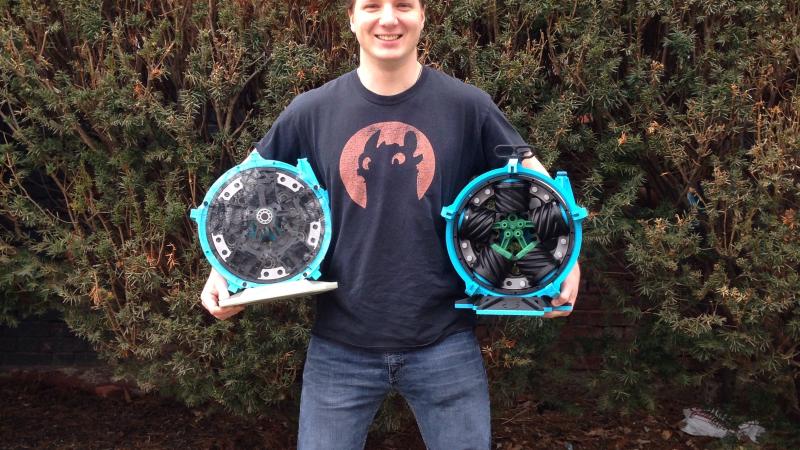Utilizing inventive solutions
May 8, 2018

In high school, Joseph Vengen faced adversity and suffering every day. Born completely deaf, he received his first cochlear implant as a toddler. The technology opened doors but has limitations in noisy environments. Too often, Vengen was left feeling isolated and frustrated.
To help him overcome his struggles, Vengen’s father issued a challenge: Channel that energy and frustration into the productive task of inventing a better combustion engine. His mother encouraged him to follow the Buddhist practice of chanting Nam-Myoho-Renge-Kyo with the determination to become happy no matter what.
Vengen took both parents’ advice—with impressive results. He will graduate with the Rensselaer Polytechnic Institute Class of 2018 with a bachelor’s degree in mechanical engineering, a patent for an alternative to the traditional piston engine, and another invention in the works.
He describes Rensselaer as “the right place for someone who’s passionate about designing, building, and inventing,” and credits his parents with “giving me the spark I needed to determine the direction of my life.” Vengen also attributes much of his success to his Buddhist practice and membership in the Soka Gakkai International of America, which has helped him overcome his many challenges.
His patented engine design relies on a rotating valve ring and rotating piston assembly to reduce the number of moving engine parts, decrease wear and tear, and increase power and fuel efficiency. His second invention, still in its early stages, was inspired by his personal experience with music and his ability to change sound by tweaking his implant. Vengen has developed software that enables him to customize music in new ways. His hope is that others can use his invention to redefine music by creating their own auditory experiences.
Vengen’s immediate goal is to sell the patent and his company, Vengen Technologies LLC. Meanwhile, he plans to work as a mechanical engineer, ideally in research and development for a smaller company with potential for growth.
He owes his decision to attend Rensselaer to his younger brother, Evan, who came to the Institute in 2015 to study nuclear engineering. At the time, Joseph Vengen attended a different school and was in a co-op program in Lancaster, New York. On weekends, he traveled across the state to see Evan.
“Every time I visited the campus, I regretted not seriously considering this school when applying to colleges,” Vengen said. “By the end of the co-op, I applied to transfer.”
He came to Rensselaer in spring 2016, immediately joined the Humans vs. Zombies Club, and was the “last man standing” after a five-day game. In fall 2017, he completed a mechanical engineering internship at Sikorsky Lockheed Martin. As part of a capstone team, Vengen helped design and build a fully functional glove to assist a quadriplegic in tasks such as writing, brushing teeth, and shaking hands.
He and his brother routinely exercise together at the Mueller Center. They recently joined the Rensselaer Entrepreneurship Club, which has introduced them to StartUp Tech Valley and networking events that eventually could help Vengen realize his goals. His advice to other students: Take advantage of opportunities on and off campus. “So much of the education occurs out in the real world,” Vengen said.
Students like Joseph Vengen exemplify the vision of The New Polytechnic, an emerging paradigm for higher education which recognizes that global challenges and opportunities are so great they cannot be adequately addressed by even the most talented person working alone. Rensselaer serves as a crossroads for collaboration—working with partners across disciplines, sectors, and geographic regions—to address complex global challenges, using the most advanced tools and technologies, many of which are developed at Rensselaer. Research at Rensselaer addresses some of the world’s most pressing technological challenges—from energy security and sustainable development to biotechnology and human health.
About Rensselaer Polytechnic Institute
Rensselaer Polytechnic Institute, founded in 1824, is America’s first technological research university. For nearly 200 years, Rensselaer has been defining the scientific and technological advances of our world. Rensselaer faculty and alumni represent 86 members of the National Academy of Engineering, 17 members of the National Academy of Sciences, 25 members of the American Academy of Arts and Sciences, 8 members of the National Academy of Medicine, 8 members of the National Academy of Inventors, and 5 members of the National Inventors Hall of Fame, as well as 6 National Medal of Technology winners, 5 National Medal of Science winners, and a Nobel Prize winner in Physics. With 7,000 students and nearly 100,000 living alumni, Rensselaer is addressing the global challenges facing the 21st century—to change lives, to advance society, and to change the world. To learn more, go to www.rpi.edu.